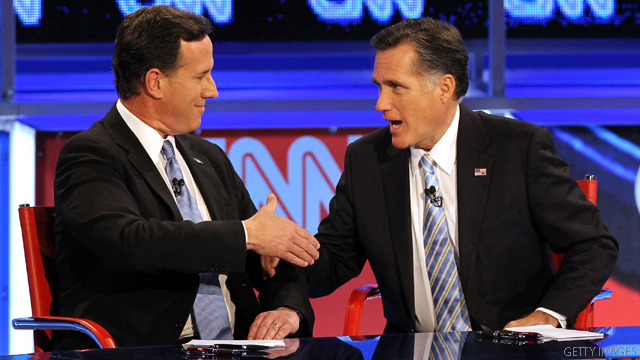In a recent article posted on a libertarian website called UnitedLiberty.org, Jeremy Kolassa argues that the Republican Party “must repudiate Rick Santorum and social conservatism” and “expel the social conservatives from the party,” lest they “throw the 2012 election and perhaps relegate themselves to a non-party as early as 2024.” In other words, in order to win in 2012, and avoid irrelevance within a decade, the Republican Party should banish its largest and most loyal voting bloc — arguably its entire base — and have it split off into a competing third party.
One can almost hear the Looney Tunes theme playing in the background.
Obviously a glutton for punishment, Kolassa tries to defend this peculiar theory of addition-by-subtraction by skewing polling data from Gallup indicating that Americans are growing distasteful of all things socially conservative. For example, he says that “support for the death penalty is falling,” but the poll he cites shows that Americans favor the death penalty by a margin of 61-35%. Even 46% of Democrats in favor of it. He also indicates that 50% of Americans want marijuana legalized, but the poll he cites does not indicate how many of that number support the use of marijuana only when prescribed by and used under the supervision of a physician. He then stumbles around the abortion issue, saying principled arguments can be made on both sides (no, they cannot), but ignores the data in his own poll showing that by a margin of 51-39%, Americans believe abortion to be immoral. Even his half-hearted concession that “the overall majority of America is religious” is somewhat misleading, because it so vastly understates the data that he links to showing an overwhelming 83% of Americans claiming a religious affiliation.
Yet, from all this data he extrapolates that Republicans have decided “to go down the road that everyone else is not taking.” He acknowledges that a plurality of Americans identify themselves as conservative, but then simply declares — without any supporting research — that the vast majority of these must be fiscal, not social conservatives, with the implication being that the Republican Party can live, indeed, would be better off without the latter.
Mr. Kolassa is correct to imply (sloppily though he does) that the Republican Party needs to reach out to the center and capture those voters in the middle in order to win. To some conservatives, such thinking borders on heresy, but really it’s just a question of mathematics.
For better or worse, ours is a two-party system. Of the two parties, clearly the Republican Party remains the better vehicle by which to advance the principles of limited government, free enterprise, and individual liberty. But you have to win in order to rule, and you win by creating a bigger tent than the other side. That means Republicans should welcome voters, and even politicians, with more moderate views. Had Republicans done so in Delaware and Nevada in 2010 (as they had in Massachusetts), the GOP would today have 49 seats in the Senate, and would be in a prime position to score a governing majority in the upcoming election. Instead, two far right conservatives were nominated and both lost elections that more moderate Republicans would have been all but guaranteed to win. The result is that the Democrats now maintain a conformable six vote majority in the Senate.
But where Kolassa loses his way is in his argument that Republicans will maximize their votes by capturing the middle not through inclusiveness, but by expelling the Republican base. Here, Kolassa should consider doing some math of his own. According to his own polling data, only 35% of Republicans support legalizing marijuana use. Does Kolassa really advocate the expulsion of the other 65%? Only 28% of Republicans support gay marriage. Does Kolassa really seek to eject the other 72%? Only 22% of Republicans oppose the death penalty. How, Mr. Kolassa, are Republicans supposed to win without the other 78%?
In the final analysis, Kolassa’s plan would not result in a more electable Republican Party, but rather the transformation of it into the Bull Moose Party Redux. In other words, it would become a small, unprincipled third-party built around a hodgepodge of policies bound to be rejected both by the social right that it discarded, and by the left for not embracing socialism. The result would be a split in the Republican vote and a guaranteed victory for Democrats.
Fortunately, after the actual Bull Moose Party handed the election of 1912 over to Woodrow Wilson (which resulted in the Espionage and Sedition Acts, over 100,00 Americans being killed in the First World War, and the creation of the Federal Reserve), it was never again taken seriously. Neither should be Mr. Kolassa’s article.
Mr. Kolassa concludes his almost unreadable piece by noting that “The 2012 election will be an insightful one.” No, Mr. Kolassa, elections are not capable of perception, so they cannot be “insightful,” though they can be instructive. Mr. Kolassa’s article is neither.

